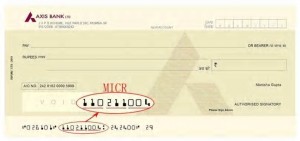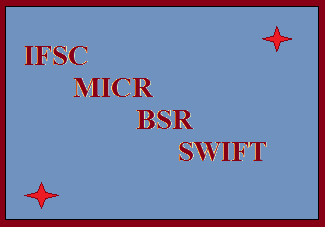Hello aspirants
We have provided the important codes or numbers used in banking and finance system with basic details which will be helpful for your upcoming exams.Here we have provided complete list with details of different codes.
List of Codes/Numbers and explanation has given below the table
| Name of the Code | Short form | Number of digits or Characters of codes |
| Indian Financial System Code | IFSC | 11 Alpha numeric code |
| International Securities Identification Number | ISIN | 12 Alpha Numeric code |
| Permanent Account Number | PAN | 10 Alpha Numeric code |
| Legal Entity Identifier | LEI | 20 digit alpha numeric code |
| Tax Deduction and Collection Account Number | TAN | 10 Alpha Numeric code |
| Society for Worldwide Interbank Financial Telecommunication | SWIFT | 8 to 11 Alphabetic code |
| AADHAR | AADHAR | 12 digit code |
| Universal Account Number | UAN | 12 digit code |
| Permanent Retirement Account Number | PRAN | 12 digit code |
| Mobile Money Identifier | MMID | 7 digit code |
| Magnetic Ink Character Recognition | MICR | 9 digit code |
| Basic Statistical Returns | BSR | 7 digit code |
IFSC (Indian Financial System Code)
Is is an alphanumeric code that uniquely identifies a bank-branch participating in the two main Electronic Funds Settlement Systems in India: the Real Time Gross Settlement (RTGS) and the National Electronic Funds Transfer (NEFT) Systems. It is an 11-character code assigned by Reserve Bank of India for the identification of the bank branches.
Recently the State Bank of India (SBI) changed the IFSC of all its branches after the merger of its 5 associate banks.
The components of IFS code are:
- The first four alphabetic characters representing the bank name,
- The fifth character is 0 (zero) and reserved for future use, and
- The last six characters (usually numeric, but can be alphabetic) representing the branch.
A list of IFS Code for all the banks can be find out on the RBI website. It is also generally available on your bank account passbook, cheque book.
Example: IFS Code of a branch of Punjab National Bank in Delhi is PUNB0614800.
MICR (Magnetic Ink Character Recognition)
A unique code used to identify the particular branch of a particular bank. It is used mainly by the banking industry to ease the processing and clearance of cheques and other documents. The technology allows MICR readers to scan and read the information directly into a data-collection device. Unlike barcodes and similar technologies, MICR characters can be read easily by humans. It is a 9-digit code.
The components of MICR code are:
- The first three digits represent the city code of the bank branch – generally the pin code initials,
- The next three digits represent the bank code, and
- The last three digits represent the bank branch.
Example: MICR-No of a branch of Punjab National Bank in Delhi is 110024490
The MICR encoding, called the MICR line, is at the bottom of cheques and other vouchers as shown below:
BSR (Basic Statistical Returns)
- 7-digit code
- BSR code will be allotted to banks by Reserve Bank of India.Bank BSR code is not a branch code.BSR code will be assigned to each branch of a bank seperately to identify submission of returns to the RBI by Income Tax Department through online upload of challan details, named as OLTAS (Online Tax Accounting System).While filling TDS/TCS (tax deducted at source/ tax collected at source) returns, BSR code is used in details related to challan and deductee.
Example: BSR Code of a branch of Punjab National Bank in Delhi is 305066.
SWIFT (Society for Worldwide Interbank Financial Telecommunication)
- 8 to 11 Alphabetic code
- It is approved by the International Organization for Standardization (ISO). A SWIFT code is an internationally recognized bank code to identify the bank all over the world.
- It is a Belgium based secure financial messaging service used by over 11,000 banking and securities organisations.
- SWIFT Codes are used when transferring money between banks, particularly for international wire transfers, and also for the exchange of other messages between banks in a secure standardized and reliable environment.
- SWIFT Code is required for overseas fund transfer for the particular bank.
The components of SWIFT code are:
- The first four alphabetic characters representing the bank name,
- The next two alphabetic characters represent the country name
- The next two letters or digits represent the location code, and
- The last 3 letters or digits represent the branch code.
Example: SWIFT Code of a branch of Punjab National Bank in Delhi is PUNBINBBDRG
*Note: Not all bank branches have individual SWIFT codes, so if it is not available for your branch, you can use the SWIFT code of a nearby branch of same bank. SWIFT code is also known as Bank Identifier Code (BIC).
SWIFT gpi:
The SWIFT Global Payment Initiative(gpi) is the latest initiative launched by SWIFT to improve customer banking experience in the world.
As of March 2019, 11 Indian banks have signed up for SWIFT gpi. These include private lenders like ICICI Bank, HDFC Bank, Axis Bank, YES Bank, Federal Bank, IndusInd Bank and City Union Bank. State-run banks like Punjab National Bank, Union Bank of India, Bank of India and Indian Bank have also signed up.
Permanent Account Number (PAN)
- 10-character alpha-numeric code
- It helps to identify the Indian nationals and regular Income Tax payer under the Indian Income Tax Act, 1961.
- It is issued by the Indian Income Tax Department under the supervision of the Central Board for Direct Taxes (CBDT). Income Tax PAN card will be issued under Section 139A of the Income Tax Act.
- PAN is mandatory when filing Income Tax returns, tax deduction, ,for opening a new bank account, a new landline telephone connection / a mobile phone connection, purchase of foreign currency, high-value transactions ,bank deposits above ₹50,000, purchase and sale of immovable properties, vehicles etc.
Component of Pan Card:-
10 Alpha Numeric code Ex:- DDDPS1234L
i.First five characters – alphabetic letters,
ii.Next continue with four numerals,
iii.last character is again alphabetic letter
First three character – Letters of any alphabet sequence from A to Z.Fourth character is the type of holder. For instance – DDDPS1234L , P indicates – for individual or personal.Other types as follows
A — Association of Persons (AOP)
B — Body of Individuals (BOI)
C — Company
F — Firm
G — Government
H — HUF (Hindu Undivided Family)
L — Local Authority
J — Artificial Juridical Person
P — Individual
T — Trust (AOP)
K — Krish (Trust Krish)
iv. The fifth character of the PAN is either the first character
- of the surname or last name of the person, in the case of a “Personal” PAN card, where the fourth character is “P” ex – DDDPS1234L to Senthil Kumar or
- of the name of the Entity, organisation and Govt.
v.The last character is an alphabetic check digit.
Tax Deduction and Collection Account Number (TAN)
10 Alpha Numeric code.It will be issued to persons who are requisite to deduct tax (TDS) or collect tax(TCS) on payments made by them under the Indian Income Tax Act, 1961.
- Without TAN number TDS/TCS returns will not be accepted .
- Challans for TDS/TCS payments will not be accepted by banks.
- iTAN is applied through “Form No. 49B” (prescribed under Indian Income Tax Law).
Component of TAN Card:-
- First four characters should be alphabetic letters ( in this first 4 characters represent – city or state and 4th character is name of the deductor)
- The next five are numerals , last character is again a alphabetic letter. Example – ABCD12345M
AADHAR
- 12-digit code
- An Aadhaar card is a 12-digit Unique Identification (UID) number. It is the biometric ID system.
- It is issued by the government of India to each citizen of the country.
- The Unique Identification Authority of India (UDAI under the Planning Commission of India, is responsible for managing Aadhaar numbers and Aadhaar identification cards.
Universal Account Number (UAN)
- 12 digit code
- A Universal Account Number (UAN) will be generated by Employees Provident Fund Organisation(EPFO) for each of the PF contributing members .
- The number allows portability of PF accounts to claim or withdrawal of EPF balance. The UAN will act as an umbrella for the multiple Member Ids allotted to an individual by different establishments.
Permanent Retirement Account Number(PRAN)
- 12 digit code
- PRAN is a unique 12 digit number issued to the state and central employees to receive their pension throughout their life under the National Pension System (NPS)(This NPS scheme was launched in 2004). It is regulated by the Pension Fund Regulatory and Development Authority (PFRDA), created by an Act of the Parliament of India.
- The number remains active for the lifetime of a subscriber.
International Securities Identification Number (ISIN)
- 12 Alpha Numeric code.
- It is an international numbering system developed by the International Organization for Standardization (ISO) to number specific securities, such as stocks (equity and preference shares), bonds, options and futures and other settlements.
- First two digits – country code,
- Next nine digits – unique identification number for the security
- Last digit – check digit
E.g – INA082B07072.
Legal Entity Identifier (LEI)
- 20 digit alpha numeric code
- The Legal Entity Identifier (LEI) is a 20-digit, alpha-numeric code developed by the International Organization for Standardization (ISO). It is a key measure to improve the quality and accuracy of financial data systems for better risk management.
- Legal entity: Legal entities are organizations like companies or government entities that participate in financial transactions.
Mobile Money Identifier (MMID)
- 7-digit code
- It is issued by the bank to their Mobile Banking registered customers for availing IMPS service as a beneficiary. You will have different MMIDs for different accounts and all these could be linked to a single registered mobile number.
- First four digits – to identify the bank of the user
- Next three digits – to identify the account of the user.
Click here attend important codes in banking related quiz





